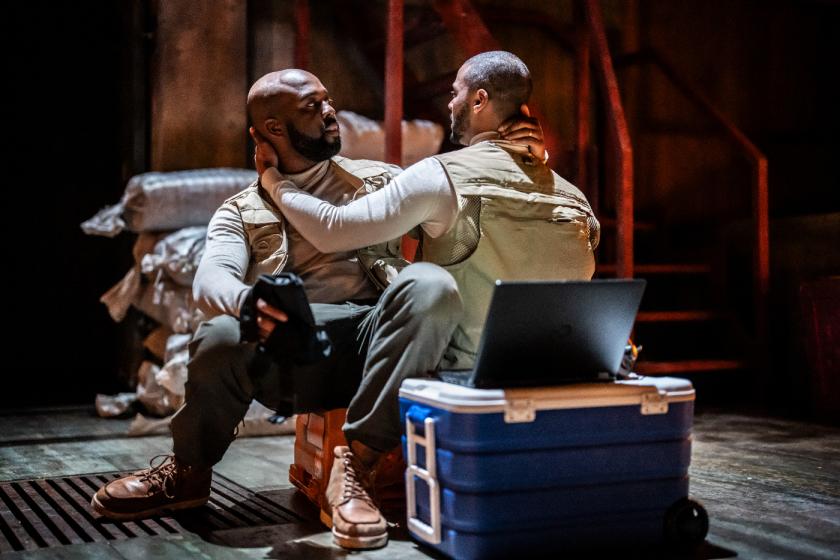Detective Chief Inspector Othello leads a quasi-paramilitary team of Metropolitan Police officers investigating gang activity in Docklands. With a chequered past now behind him, he has reformed and has the respect of both the team he leads and his superior officers. But his secret marriage to Commander Brabantio’s daughter, Desdemona, unleashes a stream of racist invective from her father, triggering memories of abuse that are never far from the surface.
Meanwhile his Detective Sergeant, Iago, lurks in the shadows, plotting revenge for his slight in being overlooked for promotion. Ola Ince’s Othello is very much in the here and now, bristling with the energy of the streets barely beyond the doorway of the theatre, seamlessly importing 2024’s hot button topics into a 1604 play, as likely as any Shakespeare production this year to drag a teenager away from Tik Tok. All that "Street, Street, Street" comes at a cost, but there’s always a compromise in staging canonical works – the only question is whether it works. The many changes made to the First Folio text loses much of its poetry, which is further buried in line readings that foreground veracity over verse. The rhythms underlying speeches disintegrate in the urgency of the exchanges, which undermines the nobility of Othello, but anchors him more explicitly to his origins, opening up a key theme for the production. In the coda, this aspect of his character, one that white society will not see past, is brutally underlined, prompting a hollow laugh around the auditorium – a good point that lands well.
The many changes made to the First Folio text loses much of its poetry, which is further buried in line readings that foreground veracity over verse. The rhythms underlying speeches disintegrate in the urgency of the exchanges, which undermines the nobility of Othello, but anchors him more explicitly to his origins, opening up a key theme for the production. In the coda, this aspect of his character, one that white society will not see past, is brutally underlined, prompting a hollow laugh around the auditorium – a good point that lands well.
This thoroughgoing updating of the text (there's a lot of Sweeneyesque "Guving" directed to Othello) also allows an interesting dynamic to develop between Eton boy, Michael Cassio, and Chelsea girl, Desdemona. Oli Higginson (pictured above with Poppy Gilbert) lends an easy charm and confidence to the young Detective Inspector, Othello’s protégé, that one sees in his accent and look. He is at ease in a touchy-feely relationship with his friend, Dessie (which is exactly what a man like Cassio would call a woman like her) and Poppy Gilbert returns that comfortable, almost intimate, socialising. They are of the same upper-middle class and know each other’s normative behaviours. Everyone else does not, especially the man who grew up running with troublemakers and who is now Dessie’s husband.
That’s only the start of Othello’s doubts about his wife’s fidelity. It is, of course, kindled and sustained by the fetid breath of Iago, blowing on the flames he has lit, leading to the catastrophic conflagration that consumes them all. This production augments Iago’s personalised evil with the generalised evil of racism within which Othello is obliged to swim, exemplified most obviously by the (entirely) black suspects pinned to the operations room wall and the white superiors judging, judging, judging.
Having seen Sinéad Rushe’s recent Othello at the Riverside Studios brilliantly unpack the complexities of Iago’s character by using three actors to play the role, a similar trick is used here somewhat differently, but equally successfully. Ken Nwosu is accompanied at times of stress by a second Othello, Ira Mandela Siobhan, whose movement embodies the subconscious turmoil in his mind. We see Othello literally wrestling with himself, hitting us hard with WEB Du Bois identification of the "two-ness" a black man must maintain to navigate an overwhelmingly white environment. This aspect of the play is explored in a superb essay by Jeffrey Boakye, a rare instance of a programme’s content fully justifying its price.
This device, and the sensitivity of the two actors in the single role, served to explain the suddenness of the hitherto self-possessed, intelligent, thoughtful Othello’s taking against his wife, who may be a little naive, but whom he knows loves him, even unto the end. It’s not a smile or two between the toffs that sets him on his disastrous path, nor even the scheming of Ralph Davis’s hideous Iago that so fans the flames of jealousy, but the burden of a lifetime spent being two persons that sum to less than one. Iago simply picks up the neurosis and shapes it into the psychosis that overtakes Othello’s reason.
Not that the production absolves him of the guilt attendant on the murder – it’s clear that we’re in a heightened reality and that racism is the engine of a psychological struggle and not a defence to murder. The violence is, as it always is in this play, shockingly up close and personal, premeditated and appallingly misogynistic in its roots and its expression. We are not invited to sympathise with the cold-blooded killer, but we are invited to understand the fullness of his psychodrama, viciously orchestrated by Iago.
I suppose some purists will rail against the more radical modifications and the explicit imposition of the theme of men’s (specifically black men’s) mental health that runs so strongly through the three-hours running time. Others will welcome the analysis of the eponymous character in a play that often focuses more on the contradictions of the unrepentant Iago.
It is a mark of the production’s success that the Shakespeare work that I have thought about more than any other, has revealed new depths, new relevance and will enrich my viewing of Othellos in the future. It is, I’d suggest, a price worth paying for the denial of some of the verse.
- Othello at the Sam Wanamaker Playhouse, Shakespeare's Globe until 13 April
- More theatre reviews on theartsdesk















Add comment